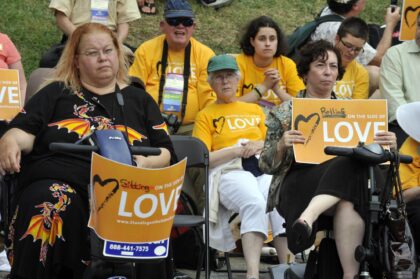 When some felt excluded by his lyrics, Jason Shelton chose to reimagine “Standing on the Side of Love”
When some felt excluded by his lyrics, Jason Shelton chose to reimagine “Standing on the Side of Love”
For years the Rev. Jason Shelton had heard rumblings about his song “Standing on the Side of Love.” People with disabilities felt excluded by the words. Shelton, who just completed nineteen years in music ministry at First Unitarian Universalist Church in Nashville, Tennessee, had even heard that the song had been unofficially banned at General Assembly.
The phrase was first spoken by Unitarian Universalist Association President William G. Sinkford in 2004. Shelton was meeting with Sinkford at the UUA headquarters when word came that President George W. Bush had called for a constitutional amendment banning same-sex marriage. Sinkford took a call to tell a reporter: “We are standing on the side of love.” Shelton started scribbling notes and lyrics. The song seemed to jump out of the walls of 25 Beacon Street in “one of the most powerful, sacred, creative moments I’ve ever experienced,” he says.
The song quickly became an anthem sung at state capitols across the country in the fight for marriage equality. It became a rallying cry when Unitarian Universalists were thrown into jails in 2010 in Phoenix alongside immigrants demonstrating for their rights, and during the “Justice GA” there in 2012. And the UUA’s public advocacy campaign is named for it, making “Standing on the Side of Love” the slogan our faith is known for, emblazoned on yellow T-shirts that pop out of the crowd at all kinds of demonstrations.
But many disabled people felt the words did not speak for them.
At General Assembly 2016 the Rev. Theresa Soto spelled out for the denomination how “ableist” language makes her feel. Soto, now interim minister of the UU Congregation of Flint, Michigan, has cerebral palsy. The theme for ministers that week had been walking, as a spiritual practice and a metaphor—woven through homilies, readings, and hymns. At the Sunday service Soto, who was being recognized as a newly fellowshipped minister, sat at the front of the stage in her scooter. She held up an “Ouch” sign at every “standing” or “walking” metaphor.
Her act got Shelton thinking more about his song. In August 2016 he decided to change the lyric to “Answering the Call of Love.” The vowels and syllables scanned, and he believes, the new words make a more flexible metaphor.
The only person who directly raised concerns to Shelton about the song was Helen Bishop, a master-level credentialed religious educator from Hendersonville, North Carolina. Bishop, who had polio, now uses a power wheelchair. At a workshop they were both leading a decade ago, people wanted to sing Shelton’s song. She asked them not to. She didn’t say the word “standing” should never be used, but “you need to show me you know I’m in the room.”
That’s where the pain comes from—not from the words themselves, but the thoughtlessness, reinforced, she says, with repeated cases where the lift doesn’t work, or you have to enter through the back door and around the kitchen, or present from the floor when everyone else is on a stage.
“We need to have a moment,” she says, “that acknowledges there are people in the room who cannot hear, so we need to use the microphone; who do not intake information, so we need to repeat. . . . We can’t possibly know how to accommodate everybody because we don’t know what all the needs are. Please let us know, and if our language is problematic, we’re sorry.” She moves her fist in a circle on her chest in American Sign Language.
Soto agrees. If a congregation wants to sing a song with embodied metaphors—“Guide My Feet,” “One More Step,” or “Do You Hear?”—she suggests some context: “Hey, we’re going to sing about feet now. Just remember, walking is not our only spiritual expression. We have all kinds. . . . That takes seconds, and it makes more space.”
The Rev. Suzanne Fast, a leader of the advocacy group EqUUal Access, goes further. “So many of our hymns are exclusionary. We really need new hymns. . . . What concerns me most is that we’re still writing new hymns that use pernicious body imagery. We need hymns that celebrate all of the ways our bodies work.”
“The idea that the word ‘stand’ does not have to do with actual standing,” Fast continues, “I don’t buy it. . . . Unless you can find me a place where etymologically the word is coming from some other source, the idea is that when you stand, you have power.”
How has the new lyric played to UUs who aren’t part of these conversations? After singing “Answering the Call of Love” for the first time in May, members of the First Unitarian Universalist Society of Middleborough, Massachusetts—my own church—generally agreed that a songwriter has a right to rewrite a song. Some said they were happy to make changes in solidarity with any group that feels excluded. Others said the change struck them as ludicrous. They’d rather work on making every church and pulpit accessible.
Two altos in the choir said numerous ability metaphors still in the song jumped out at them: “hands joined together,” “unwilling to hear,” “vision,” “made whole.” “To me this is the reason conservatives have traction [when they mock liberals for political correctness],” one said. “How far are you going to go? Are you going to change the English language? It’s a really important conversation to have, but write another song. To change this one is ridiculous.”
A woman who suffers from multiple chronic issues and at times has not been able to walk or stand said: “To me, those words don’t exclude anyone. If we had a church without an elevator or access, that would be excluding them. It’s a metaphor.”
One of the first lesbians to marry in 2005, whose partner’s disability motivated the church to remove a pew for wheelchair accessibility, reflected: “I sang that song at the State House, and it has great meaning for me. Then I got to thinking, it’s just fine. Sometimes I, too, have trouble standing. But my heart still loves the original words.”
Perhaps the best place for these hard conversations is in churches, among people committed to one another. When someone in your community says they’re feeling pain or rejected, you can’t just ignore that, Shelton explains. What’s the work we need to do together to navigate that pain so we become a spiritually mature community? Sometimes we may need to make big changes ourselves. Sometimes we may need to develop coping skills together. We need to keep asking, “How can we learn from the hurt?”
“There’s a larger conversation around liturgical language as metaphor that we need to have,” he says. “But we’re not going to have it if the people who hold power treat language as sacred, unchangeable text. How do you move toward equalizing power? I decided I could sacrifice one of my darlings.”
At the 2017 GA in New Orleans, Shelton spoke about his decision to change the lyrics and led the room in singing the new version. Delegates later voted overwhelmingly in favor of a Responsive Resolution written by Soto to change the name of the Standing on the Side of Love campaign.
Nora Rasman, the Standing on the Side of Love campaign manager, supports changing its name also. How quickly that can happen will be up to the next UUA president, she says. More important, she says, is making justice work, such as demonstrations, more accessible; helping all UUs change their thinking about disability; recognizing that disability-justice leaders objected to the name nine years ago before it was adopted; and now bringing their leadership and goals into the campaign.
Shelton is now focusing on at-large music ministry, getting congregations singing and growing together. He’s been working on a song called “Get There”: “I’m going to get there, headed toward beloved community. Some of us will be running, rolling, crutching, don’t care how you get there.”
Bishop, Soto, and Fast each say they were deeply touched by Shelton’s willingness to at first feel a little hurt himself, then listen to what they had to say, wrestle with it, and make such a large gesture to his disabled colleagues, out of love. Both Soto and Fast chose “Answering the Call of Love” to be sung at their ordinations this past year, in Salem, Oregon, and Fort Myers, Florida, respectively. There wasn’t a dry eye in either house.



